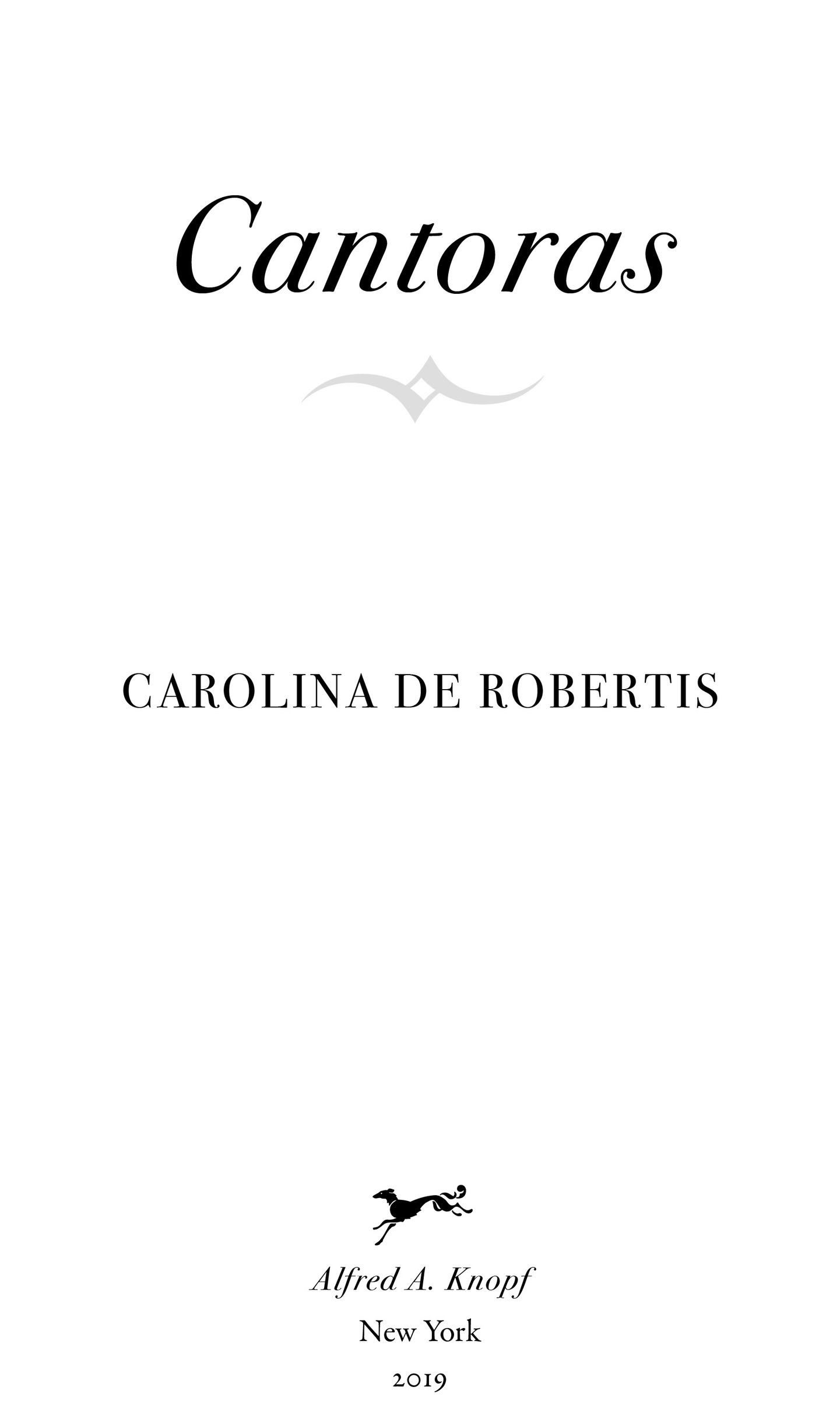A LSO BY C AROLINA D E R OBERTIS
F ICTION
The Invisible Mountain
Perla
The Gods of Tango
T RANSLATION
Bonsai by Alejandro Zambra
The Neruda Case by Roberto Ampuero
Against the Inquisition by Marcos Aguinis
The Passion According to Carmela by Marcos Aguinis
Surrender by Ray Loriga
A S E DITOR
Radical Hope: Letters of Love and Dissent in Dangerous Times
THIS IS A BORZOI BOOK PUBLISHED BY ALFRED A . KNOPF
Copyright 2019 by Carolina De Robertis
All rights reserved. Published in the United States by Alfred A. Knopf, a division of Penguin Random House LLC, New York, and distributed in Canada by Penguin Random House Canada Limited, Toronto.
www.aaknopf.com
Knopf, Borzoi Books, and the colophon are registered trademarks of Penguin Random House LLC.
Library of Congress Cataloging-in-Publication Data
Names: De Robertis, Carolina, author.
Title: Cantoras / by Carolina De Robertis.
Description: First edition. | New York : Alfred A. Knopf, 2019. | This is a Borzoi book.
Identifiers: LCCN 2018051196 (print) | LCCN 2018053629 (ebook) | ISBN 9780525521709 (ebook) | ISBN 9780525521693 (hardcover)
Classification: LCC PS 3604. E 129 (ebook) | LCC PS 3604. E 129 C 36 2019 (print) | DDC 813/.6--dc23
LC record available at https://lccn.loc.gov/2018051196
Ebook ISBN9780525521709
This is a work of fiction. Names, characters, places, and incidents either are the product of the authors imagination or are used fictitiously. Any resemblance to actual persons, living or dead, events, or locales is entirely coincidental.
Cover photographs by Pamela Denise Harris
Cover design by Jenny Carrow
v5.4
ep
Para las chicas
and to all queers and women
who have lived
outside
I was determined at all costs to become a person who would love without boundaries.
Qiu Miaojin, Notes of a Crocodile
Have you never carried inside a dormant star
That burned you wholly without shining?
Delmira Agustini, The Ineffable
Contents
1
Escape
T HE FIRST TIME which would become legend among themthey entered in darkness. Night enfolded the sand dunes. Stars clamored around a meager slice of moon.
They would find nothing in Cabo Polonio, the cart driver said: no electricity, and no running water. The cart driver lived in a nearby village but made that trip twice a week to supply the little grocery store that served the lighthouse keeper and a few scattered fishermen. There was no road in; you had to know your way. It was lonely out there, he remarked, glancing at them sideways, smiling to bare his remaining teeth, hinting, though he stopped short of asking any questions about what they were doing, why they were traveling to this of all places, just the five of them, without a man, and it was just as well because they wouldnt have had a decent answer. The trees gradually receded, but clumps of brush still reared their tousled heads from the smooth slopes as if just being born. The horse-drawn cart moved slowly, methodically, creaking with the weight of them, hoofs muffled in the loose sand. They were stunned by the sand dunes, the vast life of them. Each traveler became lost in her own thoughts. Their five-hour bus ride down the highway already seemed a distant memory, dislodged from this place, like a dream from which theyd now awakened. The dunes rippled out around them, a spare landscape, the landscape of another planet, as if in leaving Montevideo theyd also managed to leave Earth, like that rocket that some years ago had taken men to the moon, only they were not men, and this was not the moon, it was something else, they were something else, uncharted by astronomers. The lighthouse rose before them, with its slowly circling light. They approached the cape along a beach, the ocean to their right, shimmering in the dark, in constant conversation with the sand. The cart passed a few small, boxlike huts, fishermens huts, black against the black sky. They descended from the cart, paid the driver, and carried their packs stuffed with food and clothes and blankets as they wandered around, staring into the night. The ocean surrounded them on three sides of this cape, this almost-island, a thumb extending off the hand of the known world. At last they found the right place, or the closest thing to it, an abandoned house that could act as windbreak for their camp. It was half-built, with walls only partially constructed and no roof. Four unfinished walls and open sky. Inside, there was plenty of space for them; it would have been an ample house if it hadnt been left to be eaten by the elements. After they set up their things, they went outside and built a fire. A breeze rose. It cooled their skin as whiskey warmed it, flask moving from hand to hand. Cheese sandwiches and salami for dinner around the campfire. The thrill of lighting the wood, keeping it burning. Laughter spiked their conversation, and when it lulled, the silence had a glow to it, crackled by flames. They were happy. They were not used to being happy. The strange feeling kept them up too late together, giddy with victory and amazement. They had done it. They were out. They had shed the city like a hazardous garment and come to the edge of the world.
Finally they drifted to their blanket piles and slept to the gentle pulse of waves.
But deep in the night, Paz startled awake. The sky glittered. The moon was low, about to set. The ocean filled her ears and she took it as an invitation, impossible to resist. She slid out of her covers and walked down over the rocks, toward the shore. The ocean roared like a hunger, reaching for her feet.
She was the youngest in the group, sixteen years old. Shed lived under the dictatorship since she was twelve. She hadnt known air could taste like this, so wide, so open. Her body a welcome. Skin awake. The world was more than she had known, even if only for this instant, even if only in this place. She let her lips part and the breeze glided into her mouth, fresh on her tongue, full of stars. How did so much brightness fit in the night sky? How could so much ocean fit inside her? Who was she in this place? Standing on that shore, staring out at the Atlantic, with those women who were not like other women sleeping a few meters away, she felt a sensation so foreign that she almost collapsed under its spell. She felt free.
*
Flaca was the first to wake up the next morning. She walked to the bare window of the abandoned house and looked out at the landscape around her, so different by day, the great blue ocean visible on all three sides as if they were on a small island, unbound from the rest of Uruguay. Rocks and dry grass, the water beyond, a lighthouse and a smattering of huts in the distance, homes of fishermen and a box of a store somewhere among them. Shed look for it today. Shed go exploring.













